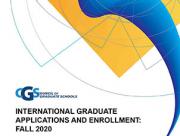You are on CGS' Legacy Site.
Thank you for visiting CGS! You are currently using CGS' legacy site, which is no longer supported. For up-to-date information, including publications purchasing and meeting information, please visit cgsnet.org.

PRESS RELEASE
Contact: Katherine Hazelrigg (202) 461-3888 / khazelrigg@cgs.nche.edu
Washington, DC —The Council of Graduate Schools (CGS) released new data showing that although international graduate application rates increased at U.S. universities for Fall 2020, first-time enrollment declined substantially. Final application counts from prospective international graduate students increased by 3% between Fall 2019 and Fall 2020, but first-time enrollment decreased by 39%. While the first-time enrollment at the master’s level declined (-43%) at a higher rate than at the doctoral level (-26%), the rate of decline was consistent across institutional types.
The decline in first-time enrollment resulted in part from a large increase in international graduate student deferments. To ensure a clearer picture of this trend, CGS fielded two additional surveys: the 2020 NAGAP/CGS Survey of Graduate Enrollment Management Professionals and the 2020 CGS International Graduate Admissions Supplemental Survey. More than 80% of survey respondents reported an increase in the number of newly admitted international graduate students who deferred, and a majority of those institutions indicated a greater than 5% increase in deferments overall when compared to prior years. The deferrals were relatively consistent across degree levels, with 12% of the offers of admissions deferred at the master’s and certificate level and 10% at the doctoral level.
“The first-time international graduate student enrollment decreases are alarming, because they undermine the international diversity and vitality of U.S. graduate programs. Between the effects of the COVID-19 pandemic, particularly on health concerns and international travel, and the lack of consistent and timely direction from the Trump administration regarding international graduate student visa policy, we were prepared to see declines,” said CGS President Suzanne Ortega. “Although the declines are concerning, we know our members have prioritized staying connected to both the students who deferred and their existing international graduate student community. When thinking ahead, one of the biggest lingering questions is how the deferrals will affect offers of admission and first-time enrollment for Fall 2021 and beyond, particularly if there are still travel limitations.”
Highlights by Field of Study
Across broad fields of study, international graduate applications increased at higher rates in mathematics and computer sciences (12%) and biological and agricultural sciences (10%) between Fall 2019 and Fall 2020. Regarding two of the largest broad fields of study, applications in engineering were consistent with last year’s numbers and business (-1%) decreased slightly. There were a large number of deferrals across both master’s and doctoral programs. Sixteen percent (16%) of master’s degree admission offers in engineering and 15% in mathematics and computer sciences were deferred. At the doctoral level, public administration and services (15%), biological and agricultural sciences (12%), and engineering (12%) had the largest share of offers deferred.
Highlights by Country of Origin
There were substantial decreases in first-time graduate enrollment in Asian (-47%) and Middle Eastern & North African (-36%) regions. For example, in China and India, two countries that consistently represent the largest shares of international graduate applications, first-time enrollments, and total enrollments, there were significant decreases in first-time graduate enrollment, -37% and -66%, respectively. There were less significant declines in first-time international graduate student enrollment from Canada (-5%) and Mexico (-6%), most likely due to fewer travel restrictions.
About the survey and report
Conducted since 2004, the CGS International Graduate Admissions Survey tracks the applications and enrollments of international students seeking U.S. master’s and doctoral degrees. As the only report of its kind to offer data on the current academic year, International Graduate Applications and Enrollment: Fall 2020 reports applications, admissions, and enrollments of international master’s, certificate, and doctoral students at U.S. colleges and universities. In Fall 2016, the survey was redesigned to collect data by degree objective (master’s and graduate certificate vs. doctorate), and for all seven regions of origin, eight countries of origin, and all eleven broad fields of study, yielding the only degree-level data currently available for graduate admissions and enrollments. 360 U.S. graduate institutions who are members of CGS or its regional affiliates responded to the 2020 survey.
###
The Council of Graduate Schools (CGS) is an organization of approximately 500 institutions of higher education in the United States and Canada engaged in graduate education, research, and the preparation of candidates for advanced degrees. The organization’s mission is to improve and advance graduate education, which it accomplishes through advocacy in the federal policy arena, research, and the development and dissemination of best practices.




